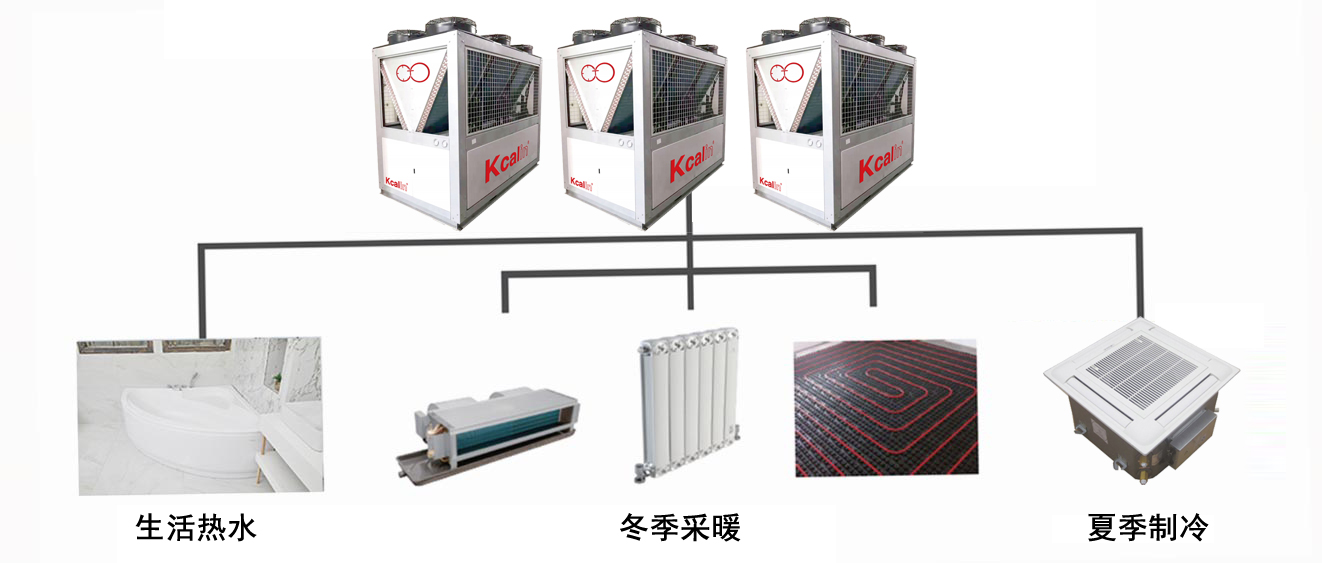Under the trend of energy conservation and environmental protection, heat pump technology has gradually become the mainstream choice for household heating, cooling, and hot water supply. Ground source heat pumps and air source heat pumps are currently two widely used types of heat pumps. They each have different working principles and application characteristics, so which one is more energy-efficient?
1、 Working principles of ground source heat pump and air source heat pump
Ground source heat pumps extract heat from underground soil or water sources through buried heat exchange pipeline systems for heating, or transfer indoor heat to underground for cooling. Its principle is similar to the heat exchange process of ordinary air conditioning, but due to the relatively stable ground temperature, the energy efficiency of ground source heat pumps is higher.
Air source heat pumps utilize the heat in the air for heat exchange, converting low-grade thermal energy in the air into high-grade thermal energy through components such as compressors, evaporators, condensers, etc., for indoor heating or cooling. Its working principle is similar to that of ordinary air conditioners, but in low-temperature environments, the performance of air source heat pumps may be affected to some extent.

2、 Energy Efficiency Comparison
The energy efficiency ratio (COP) of ground source heat pumps is usually between 4.0-5.0, which means that for every 1 kWh of electricity consumed, 4-5 kWh of heat or cold can be generated. Due to the relatively stable ground temperature, ground source heat pumps can maintain high energy efficiency throughout the year, unaffected by seasonal and climate changes.
The energy efficiency ratio (COP) of air source heat pumps is generally between 3.0-4.0, and some high-efficiency models can reach 4.5 or above. However, the energy efficiency of air source heat pumps is greatly affected by external temperature, especially in low temperature environments during winter, where the energy efficiency may decrease. Under extremely cold conditions, the performance of air source heat pumps may decrease.
Overall, the energy efficiency of ground source heat pumps is higher than that of air source heat pumps, especially in low-temperature environments where the stability and efficiency advantages of ground source heat pumps are more pronounced. Therefore, from an energy-saving perspective, ground source heat pumps have more advantages.
3、 Installation cost and maintenance
The installation cost of ground source heat pumps is relatively high, mainly due to the need to bury heat exchange pipelines underground, which involves drilling, excavation and other engineering projects. This part of the cost accounts for a large proportion of the total cost of the source heat pump system. Although the installation cost is high, its operating cost is relatively low, and long-term use can achieve good economic benefits.
The installation of an air source heat pump is relatively simple, requiring only the installation of indoor and outdoor units without the need for underground engineering, resulting in lower initial installation costs. Although the operating cost is slightly higher than that of ground source heat pumps, their total cost still has some competitiveness.
The underground heat exchange pipelines of ground source heat pumps usually do not require frequent maintenance, but the main equipment on the ground needs regular inspection and maintenance. The maintenance of air source heat pumps is relatively simple, only requiring routine cleaning and inspection of indoor and outdoor units.
4、 Application scenarios and applicability
Ground source heat pumps are suitable for places with sufficient land resources or water sources, such as suburban independent residences, villas, commercial buildings, etc. In these places, ground source heat pumps can fully leverage their high efficiency and energy-saving advantages. However, in densely populated urban areas, due to limited land resources, installing ground source heat pumps may face certain difficulties.
Air source heat pumps are suitable for various residential and commercial buildings, especially for high-rise residential and small commercial spaces in urban environments. It is easy to install and not limited by geographical location, making it a flexible and convenient choice.
Ground source heat pumps and air source heat pumps each have their own advantages and disadvantages. In terms of energy efficiency and long-term energy-saving effects, ground source heat pumps have more advantages and are suitable for users who have land resources and pursue long-term energy-saving effects. Air source heat pumps, on the other hand, are suitable for various residential and commercial places due to their easy installation and low initial cost, especially for urban environments and short-term energy-saving needs.
When choosing a ground source heat pump or an air source heat pump, users should consider their actual needs, usage environment, and economic conditions comprehensively to select a suitable energy-saving solution. No matter which heat pump system is chosen, scientific and reasonable design and installation, standardized operation and maintenance are the key to ensuring its high efficiency, energy saving and long-term stable operation.







Comment